Table of Contents
Breed at a glance

The Irish Soft Coated Wheaten Terrier is a relatively healthy breed. Their lifespan is generally 12-15 years of age; many are active and agile well into older ages. Wheaten terriers are not a common breed; they are listed as a vulnerable breed by the Kennel Club, UK with fewer than 300 registered dogs per year. Wheatens are intelligent, have a good sense of humour, and are tolerant with a good nature. The dogs do very well in performance dog sports (tracking, obedience, agility and rally). As with any dog, regular positive interactions, daily exercise, socialization and training are needed to keep the dogs from becoming bored, depressed, destructive or unruly. Terrier instincts can include hunting and prey drives - so it's best potential owners recognize these tendencies can exist in Wheatens. These dogs are considered a non-shed breed; they carry a soft coat which requires considerable grooming (brushing and combing 2-3 times a week is recommended).
Key Health Conditions
- Kidney disease - Protein-Losing Nephropathy (PLN) and renal dysplasia (Juvenile Renal Disease, JRD)
- Protein-Losing Enteropathy (PLE), Inflammatory Bowel Disease (IBD) & Digestive Issues
- Hip dysplasia
- Allergies, atopies
- Eye diseases: microphthalmia, anophthalmia, and coloboma (MAC) spectrum of congenital eye malformations, under gene RBP4
- Several clubs have notes on character and behaviour of dogs; in Scandinavia tests show some dogs are prone to fear of noises. (See Research below.)
Comment: these conditions have been noted as occurring in the breed; breeding dogs should be health/behaviour tested for the conditions mentioned. See more below.
 What do caretakers need to know
What do caretakers need to know
Irish Soft Coated Wheaten Terriers are athletic, enthusiastic, people friendly, adventurous and inquisitive. A fenced yard is a necessity to ensure safety as hunting/chasing instincts exist in this breed. Regular exercise and grooming are required. Be aware that while the dogs are considered non-shedding, that does not necessarily mean hypoallergenic - owners can be allergic to pet saliva or pet dander - not just hair. Pretty much these dogs are up for anything, are not couch potatoes, and thrive when owners spend quality time with them training, walking, and having fun interacting on a daily basis. Sound sensitivity has been noted in this breed - fireworks, gunshots, thunderstorms and heavy traffic noises can be a management issue.
Statistics and Health Strategies
Population Statistics
The Wheaten Terrier is classified as a Vulnerable Native Breed. "In order to protect those breeds of British and Irish origin that are considered at risk of disappearing, we (the Kennel Club, UK) created the vulnerable native British and Irish breeds list (breeds with fewer than 300 registrations a year) and the 'at watch' list (breeds with between 300 and 450 registrations a year) so that we can monitor them." See the KC's list of those breeds.
The AKC Rank for Soft Coated Wheaten Terriers: 2021: 66; 2020: 58; 2019: 54; 2016: 50; 2013: 51.

More information from AKC's Wheaten Terrier statistics is available on SCWTCA's website. It is important to note that registration data (numbers) are much higher than the number of dogs that are used for breeding and the numbers registered do not reflect the number of dogs born in any given year.
Health and Statistics
Agria - Swedish Breed Profiles
 CONTEXT: For many years, Agria Animal Insurance, Sweden (Agria Djurförsäkring, Stockholm, Sweden) has supported veterinary research and provided statistics on diagnoses for health and life claims to Swedish breed clubs. See Breeds with Swedish Insurance Data and Agria Breed Profiles (where breeds are compared to All Breeds)! We recommend that you download the Agria Breed Profiles for the Finnish Spitz and study them for full available information. Some excerpts are shown below! The great benefits of the Swedish insurance data are that they include almost 40% of the national population of dogs, so are very representative; note that animals at very old ages are likely under-represented. Most importantly, information is available on all insured dogs, not simply those who get sick or die. This allows calculation of population-based rates (expressed as events per 10,000 years-at-risk) as well as risks and proportions. Statistics are presented as overall morbidity (rate of one or more veterinary care events [VCE]) or mortality (death), by general diagnostic categories, and by specific diagnoses.
CONTEXT: For many years, Agria Animal Insurance, Sweden (Agria Djurförsäkring, Stockholm, Sweden) has supported veterinary research and provided statistics on diagnoses for health and life claims to Swedish breed clubs. See Breeds with Swedish Insurance Data and Agria Breed Profiles (where breeds are compared to All Breeds)! We recommend that you download the Agria Breed Profiles for the Finnish Spitz and study them for full available information. Some excerpts are shown below! The great benefits of the Swedish insurance data are that they include almost 40% of the national population of dogs, so are very representative; note that animals at very old ages are likely under-represented. Most importantly, information is available on all insured dogs, not simply those who get sick or die. This allows calculation of population-based rates (expressed as events per 10,000 years-at-risk) as well as risks and proportions. Statistics are presented as overall morbidity (rate of one or more veterinary care events [VCE]) or mortality (death), by general diagnostic categories, and by specific diagnoses.
Comment: As can be seen here, Terriers in general have very little increased risk compared to All Breeds for Veterinary Care events. As well, for Irish Soft Coated Wheaten Terriers the Median Age at first claim =7.9 years (from Agria Breed Profiles).



♦ Please see Swedish Wheaten Breeding presentation from the : Nordic Wheaten Breeders’ meeting - Stockholm 2019 ♦
Finland: Mortality Data 2012-2021
The most common specified causes of death are high age (at 13 years 9 months on average) and cancer (at 11 years 3 months on average). Source: Koiranet: https://jalostus.kennelliitto.fi/frmEtusivu.aspx?R=40

Breed-specific Breeding Strategies

Finland: JTO -Jalostuksen tavoiteohjelma 2022-2026 - Vehnäterrieri in Finnish | The JTO (breed-specific breeding strategy) for the Irish Soft Coated Wheaten Terrier (older version) in English
Sweden: Rasespesifikk avlsstrategi (RAS) in Swedish
Norway: Rasespesifikk avlsstrategi (RAS) for for the Irish Soft Coated Wheaten Terrier in Norwegian
UK: Breeding considerations | Breed Health and Conservation Plan for the Soft Coated Wheaten Terrier
France: GRILLE DE COTATION | Test de Caractère T.C1 & Test de Comportement T.C.2
US: SCWTCA Code of Ethics | Annual health testing protocols | OFA/SCWTCA recommended basic health screening tests for all breeding stock
Denmark: Racespecifik AvlsStrategi Irish Softcoated Wheaten Terrier 2014 - 2018
HGTD DNA Tests for Wheatens
The Harmonization of Genetic Testing for Dogs (HGTD) Basics: The HGTD Searchable Database - Search by Breed, Search by Disease / Test and Search by Genetic Test Provider (GTP) / Lab + Genetic Counselling Resources. HGTD catalogs information provided voluntarily from genetic test providers (GTPs) including information on their company and services, quality measures and expertise, tests offered and more. As of January 2021, the HGTD Database includes 82 academic and commercial genetic test providers (GTPs) in 22 countries. Our searchable genetic phenes (phenes = characteristics/genetically controlled feature) database currently holds information on 300+ phenes across all breeds/types and provides information on each phene: links to the Online Mendelian Inheritance in Animals database (OMIA), gene + mutations, a simple and advanced disease description, inheritance details, links to original publications, patents/licenses, comments from the original researchers/experts on application, and breed specific information (such as research/validation) - where possible. Breed Relevance Ratings (BRR) support evidence-based usage and application of genetic tests. The HGTD database relevance rating indicates the level of available evidence supporting the application of a specific genetic test for a specific breed/type. Currently, the relevance rating is based on a wide variety of evidence sources. This includes peer-reviewed research papers, recommendations from the original researchers/test developers, input from additional experts including veterinary specialists, and breed experts. It is hoped that, by being more informative about what we currently know or do not know about a specific test for a specific breed, that dog health advisors and owners can make more informed decisions. Remember, this Breed Relevance Rating is not everything we need to know about the disease or characteristic; it is focused on the genetic test.
HGTD - Irish Soft Coated Wheaten Terrier
SUMMARY: The available genetic tests for Irish Soft Coated Wheaten Terrier are generally for very rare or almost unobserved diseases/conditions. While pre-breeding genetic testing are valuable, a breeder may wish to be particularly thoughtful of genetic diversity, behaviour/temperament, and other factors when selecting mates.
♦ BIG PICTURE THINKING ♦ Please take into consideration - Most of the conditions with genetic tests are rare in the general population, but valuable for breeders to use to efficiently reduce risks while supporting good genetic diversity in the breed as a whole. See the Genetic Diversity section below. Also be aware that there are many DNA tests that are available for ALL breeds, that while the test itself is valid, the condition may not be a major health concern or included in health strategies for every breed. See the HGTD for a full list of DNA tests including "Trait" and "Parentage" tests.
Irish Soft Coated Wheaten Terriers:
Test: Degenerative Myleopathy
BRR: ![]()
HSP comment:
As with all breeds where the degenerative myelopathy (DM) test is relevant, this disease is both clinically rare and of complex inheritance. Test is considered poorly correlated with risk for development of DM, and recommendations are to not use the test for breed-wide breeding strategies. More information can be found here. Please be aware that information on this test is especially at risk of changing over time as more is understood about the condition and any risk-associated variants or environmental factors.
Test: Microphthalmia, isolated, with coloboma, RBP4-related
BRR: ![]()
HSP comment:
This condition causes abnormally small eyes (globus, e.g. eye ball), as well as other developmental eye defects in dogs, primarily caused by an absence of vitamin A. Severity can vary, but all contribute to blindness in one or both eyes, from birth. Disease is only expressed when both dam and offspring are both affected by the variant deletion (e.g. deletion homozygotes).
Test: Paroxysmal Dyskinesia
BRR: ![]()
HSP comment:
This condition can be mistaken for epilepsy as the clinical signs are very similar. It is unknown how common this could be in the breed as it is poorly recognized or assumed to be epilepsy by veterinary practices, but it is likely underestimated.
Test: Protein losing nephropathy
BRR: ![]()
HSP comment:
While this test is offered by a number of GTPs, the mode of inheritance isn’t completely understood. It appears that dogs who test homozygous for the PLN haplotype (e.g. amino acid substitutions in NPHS1 and KIRREL2) are at a very high risk of developing PLN that those dogs who are not homozygous (e.g. clear, carrier). It is not yet determined if one or both mutants are causative. In practice, it is sensible to treat test results like an autosomal recessive inheritance pattern, but it very possible that additional unknown genes and/or environmental factors are involved.
Other Genetic Traits, relevance unknown:
BRR: ![]()
Coat colour dilution (MLPH-related), Furnishings (moustache and eyebrows), and Improper coat/furnishings are all commonly offered by GTPs to this breed, but do not appear to have a breed-specific health, and therefore considered “trait” tests.
Health Screening Tests for Wheatens
UK
Breed Health and Conservation Plan for the Soft Coated Wheaten Terrier
The BHC’s Annual Health Report 2018, yielded the following response to ‘please list and rank the three health and welfare conditions that the breed considers to be currently the most important to deal with in your breed’:
1. Protein losing diseases - (Protein losing enteropathy (PLE) & protein losing nephropathy (PLN)
2. Renal dysplasia (RD)
3. Degenerative myelopathy (CDM)
UK:KC: It is recommended that all breeding stock are tested for the following prior to breeding:
- Hip scoring under the British Veterinary Association (BVA)/ KC Hip Dysplasia Scheme
- Kidney function test
- Eye testing under the BVA/KC/ International Sheepdog Society (ISDS) Eye Scheme
NOTE: a PLN DNA test is available. NOTE: a DM DNA test is available. NOTE: a DNA test for the Recessive RBP4 Defect in Canine Congenital Eye Disease is available.
Finland
No mandatory health checks (PEVISA) in Finland for registration.
JTO Finland: https://jalostus.kennelliitto.fi/RotuPDF.ashx?R=40&T=2 Aims:
- Reaction on noises should be reduced
- Reduce hip dysplasia. Breed has Estimated Breeding Values for this condition.
- Understand lineages behind protein deficiencies and map the population
- RBP4 gene test for eye diseases used more widely.
Finnish statistics
Mentalbeskrivning hund (mental description): almost 50 % of tested dogs insecure or fearful to gun shot

Eye diseases: most common findings: distichiasis, atresia of lacrimal punctum, cortical cataract

Hip dysplasia: 65-80 % of dogs have normal (A) or borderline (B) hip joints.

Elbow dysplasia: 60-90 % of dogs have normal or borderline elbow joints.

Sweden
No mandatory health checks for registration in Sweden.
RAS: https://www.skk.se/globalassets/dokument/rasdokument/ras-irish-softcoated-wheaten-terrier.pdf Notes/aims:
- RD (renal dysplasia) and PLE (protein losing enteropathy) are considered problems
- Ear infections and itching noted
- Hip Dysplasia is monitored. Breed has Estimated Breeding Values for this condition.
- Microphthalmy
- DNA testing for several issues in the breed is recommended
- Reaction to shooting in the mental description MH is higher than average (diagram 4/page 26)
Sweden Statistics:
Eye test findings by statement year 2012-2021

Hip dysplasia: 75-85 % have normal (A) or borderline (B) hip joints.
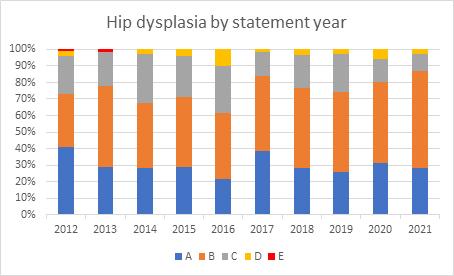
Elbow dysplasia: 70-90 % f dogs have normal or borderline (0) elbow joints.
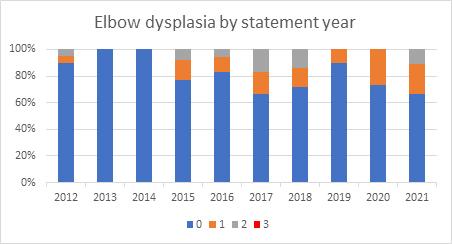
Norway
No mandatory health checks for registration in Norway.
RAS Norway: https://norskterrierklub.no/Userfiles/Sites/files/RASISWT.pdf (2019). Notes/aims:
- Reduce the incidence of hip dysplasia and use of Estimated Breeding Values
- Reduce behavioural problems (see picture below, age and reason for castration, behaviour is not the reason of euthanasia)
- Create gene tests for breeds’ hereditary problems in cooperation with Norwegian veterinary school (Veterinærhøyskolen) for sampling and mapping.
- Increase the amount of healthy dogs
- Raise breeders' awareness of anatomy by arranging educational events
Norway Statistics:
Hip dysplasia: 50-80 % have normal (A) or borderline (B) hip joints.
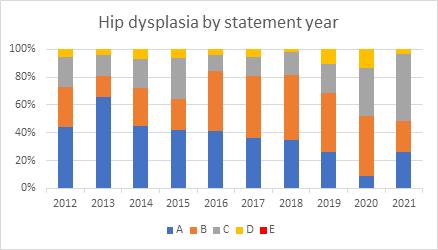
Elbow dysplasia: 90-100 % of dogs have normal or borderline (=) elbow joints.
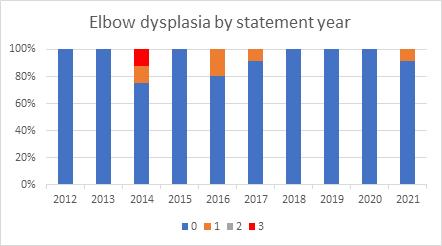
Norway Health surveillance 2020:
France
The breed has mandatory health checks for registration in France.
-
https://www.cfatdt.com/_files/ugd/06c2d4_59ccb7fa34bf4dc8b2e620b0b8e7ce49.pdf
- Normal and borderline hip and elbow dysplasia (A and B for hips, 0 for elbows) can reproduce freely
- Dogs with mild hip dysplasia (C) and borderline elbow dysplasia can produce combined to normal dogs (A and 0)
- Dogs with moderate and severe hip dysplasia and mild to severe elbow dysplasia (D, E and 1, 2, 3) not allowed to be used in breeding
Character test T1 & T2
US
See SCWTCA's website Health page
- Protein-Losing Nephropathy (PLN)
- Protein-Losing Enteropathy (PLE), IBD, Gagging, Gulping
- Renal Dysplasia
- Addison’s Disease
Other Health Concerns:
SCWTCA's Annual Testing Protocols (Includes information for Veterinarians!!!)
SCWTCA - Endowment Inc. Report 2021 (Includes follow-ups of research projects!!!)
OFA: Tests and data
Recommended tests (HD - OFA, PennHip, Eye exam - ACVO; PLN - DNA test
Test results report for Wheatens
Eye Exam Report - Blue Book for Wheatens
Netherlands
Requirements for registrations (VFR; Vereiningsfokreglement) by Dutch Kennel Club (Raad van Beheer) and breed clubs:
-
https://www.wheaten.nl/wp-content/uploads/2021/07/VFR-De-Wheatens-vanaf-1-juli-2021-getekend.pdf (7/2021)
- Mandatory eye examinations
Other noted health concerns: https://www.wheaten.nl/dewheaten/gezondheidszaken/
- Skin issues
- Hip dysplasia and patella luxation
- DNA test for microphthalmy/RBP4
- Kidney issues, as noted in other countries above
Irish Soft Coated Wheaten Terrier Club Nederland VFR:
Same as above, hip dysplasia is more strongly recommended.
Denmark
No mandatory health checks for registration in Denmark.
Irish Softcoated Wheaten Terrier in Denmark (presentation in Nordic Wheaten Terrier Breeders Conference, Stockholm 2019): https://swtk.se/swtk_2/flik9/wbg19/Skodborg_Danish_Wheaten_Breeding.pdf
RAS Denmark: https://wheaten.dansk-terrier-klub.dk/xdoc/238/racespecifik_avlsstrategi_2_0.pdf
Germany
The breed has few mandatory health checks for registration in Germany. Wheatens are under combined all- terriers club. The club is registering dogs.
Breeding requirements: https://www.kft-online.de/_data/1809-1907KfT-Zuchtordnung_nachMV2018.pdf
- For Wheatens: Hip Dysplasia normal or borderline (A1-B2), borderline (B1/B2) must be paired to normal (A1-A2).
- For Wheatens tests for PLN (Protein Losing Nephropathy)
- DNA testing: https://www.kft-online.de/_rubric/detail.php?rubric=Bek%E4mpfung+von+Krankheiten&nr=488
Breed specific site: Klub für Terrier von 1894 e. V.
Breeding statistics: https://www.kft-online.de/_data/Statistik_2014-2020.pdf
Irish Soft Coated Wheaten Terriers - Health Screening Summary - by country
R1-Mandatory for registration
R2-Recommended
R3-Recognized
| Condition | Ireland | UK | US | Finland | Sweden | Norway | Netherlands | France | Germany |
| Hip dysplasia | R2 | R2 | R2 | R2 | R2 | R2 | R2 | R1 | R1 |
| Elbow dysplasia | R2 | R2 | |||||||
| Eye Exam | R2 | R2 | R2 | R2 | R2 | R1 | R2 | R2 | |
| PLE / PLN | R2 | R2 | R3 | R2 | R2 | R2 | R2 | ||
| Renal dysplasia | R2 | R3 | R2 | R2 | R2 | ||||
| Degenerative myelopathy | R2 | R2 | R3 | R2 | |||||
| Microphthalmia with Multiple Ocular Defects - DNA test - RBP4 | R3 | R2 | R2 | R2 | R2 | ||||
| Character tests | R3 | R2 | R2 | R3 | R2 | R2 | R2 | ||
| Genetic diversity | R2 | R2 | R3 | R1 |
See: information/webinar on SCWTCA's C-BARQ Canine Behavioral Assessment & Research Questionnaire (May 2022)
Illustrated Standards
Dansk Terrier Club: Racekompendium Irish Softcoated Wheaten Terrier: Racestandard med kommentarer
Domarkompendium Irish soft-coated wheaten terrier
Illustrated pdf from judge conference 2017
Soft Coated Wheaten Terrier Presentation - Irish Soft-Coated Wheaten Terrier Club Ireland
References and Resources
DogWellNet Resources
- DogWellNet's Pedigree Dogs Database page for Irish Soft Coated Wheaten Terriers
- HGTD - Irish Soft Coated Wheaten Terrier
- Agria Breed profiles for the ISCWT 2006-2011 & 2011-2016
Research
NHGRI Soft-Coated Wheaton Terrier Lifetime Health Study (ongoing, in data collection phase)
Maria Kaukonen, Sean Woods, Saija Ahonen, Seppo Lemberg, Maarit Hellman, Marjo K. Hytönen, Perttu Permi, Tom Glaser, Hannes Lohi. Maternal Inheritance of a Recessive RBP4 Defect in Canine Congenital Eye Disease. Cell Reports, Volume 23, Issue 9, 2018, Pages 2643-2652, ISSN 2211-1247, https://doi.org/10.1016/j.celrep.2018.04.118.
(https://www.sciencedirect.com/science/article/pii/S2211124718307186
SCWTCA's research projects: https://scwtca.org/health/health-research/ & SCWTCA Endowment Inc. Funded projects 2021 report (excellent follow up info!)
Rare neurologic disease of Soft Coated Wheaten Terriers - adult paroxysmal dyskinesia
Kolicheski, A. L., Johnson, G. S., Mhlanga-Mutangadura, T., Taylor, J. F., Schnabel, R. D., Kinoshita, T., Murakami, Y., & O'Brien, D. P. (2017). A homozygous PIGN missense mutation in Soft-Coated Wheaten Terriers with a canine paroxysmal dyskinesia. Neurogenetics, 18(1), 39–47. https://doi.org/10.1007/s10048-016-0502-4
Handegård, Karin & Storengen, Linn & Lingaas, Frode. (2020). Noise reactivity in standard poodles and Irish soft-coated wheaten terriers. Journal of Veterinary Behavior. 36. 10.1016/j.jveb.2020.01.002. https://doi.org/10.1016/j.jveb.2020.01.002
Salonen, M., Sulkama, S., Mikkola, S. et al. Prevalence, comorbidity, and breed differences in canine anxiety in 13,700 Finnish pet dogs. Sci Rep 10, 2962 (2020). https://doi.org/10.1038/s41598-020-59837-z
IPFD and The World Small Animal Veterinary Association
See our series of Meet the Breed articles in the WSAVA Bulletin and associated Get a GRIHP! Articles on DogWellNet.com:
- Welsh Corgi
- Dachshund
-
French Bulldog


- Australian Shepherd
- Saluki
- Golden Retriever
- Bernese Mountain Dog
- Black Russian Terrier
- Pug
- Finnish Spitz
- Rhodesian Ridgeback
- Rottweiler
- Whippet
- Belgian Shepherd
- English Bulldog
- Irish Soft Coated Wheaten Terrier
- Dalmatian
- Border Terrier
- Staffordshire Bull Terrier
- Siberian Husky
- Dobermann
- Shih Tzu
- English Setter
- Beagle
- Chihuahua

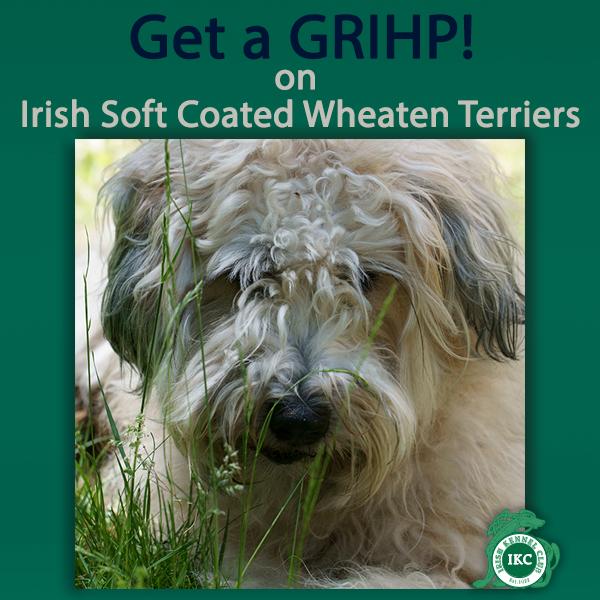
 What do caretakers need to know
What do caretakers need to know

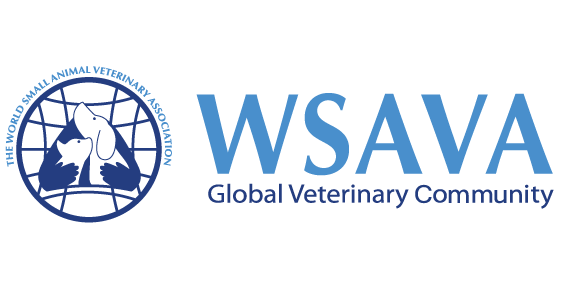
Recommended Comments
Join the conversation
You can post now and register later. If you have an account, sign in now to post with your account.
Note: Your post will require moderator approval before it will be visible.